
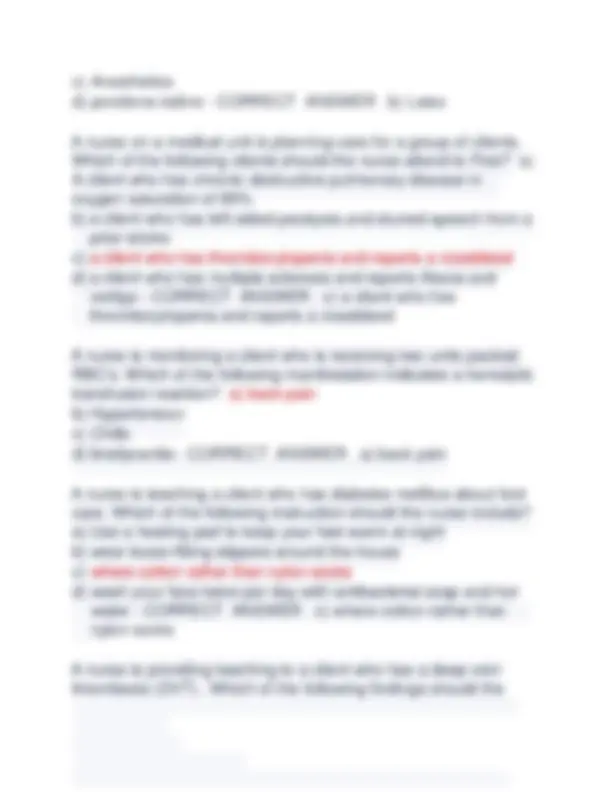
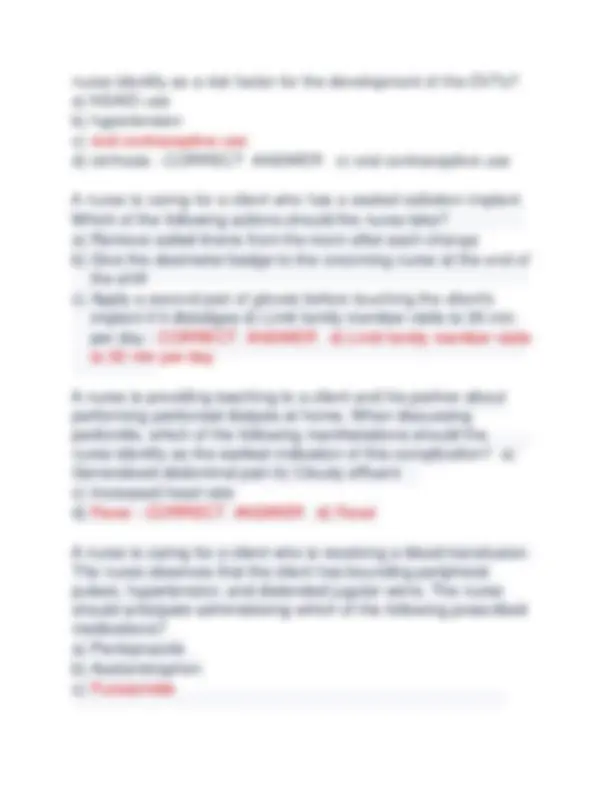
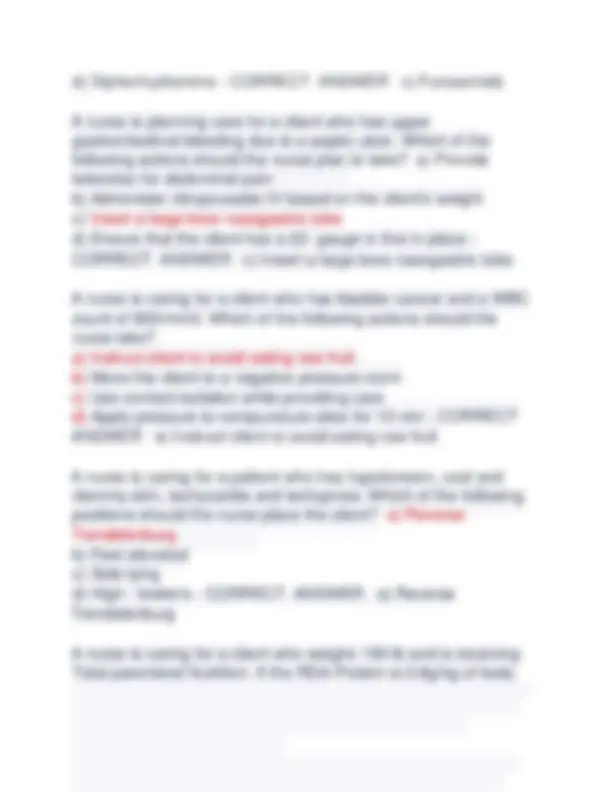
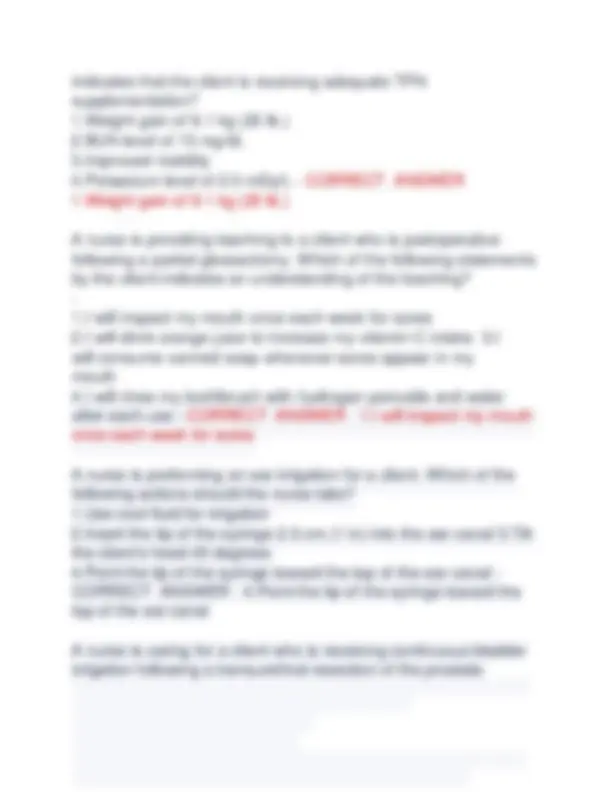
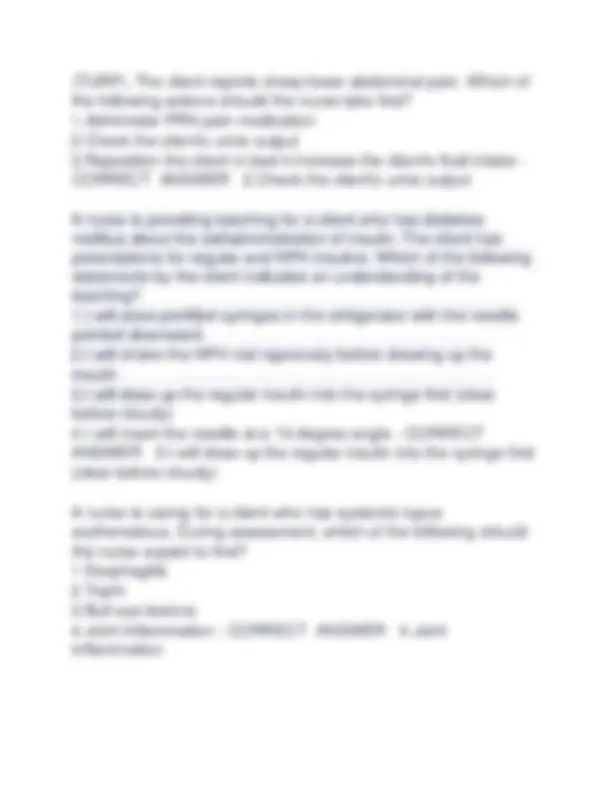
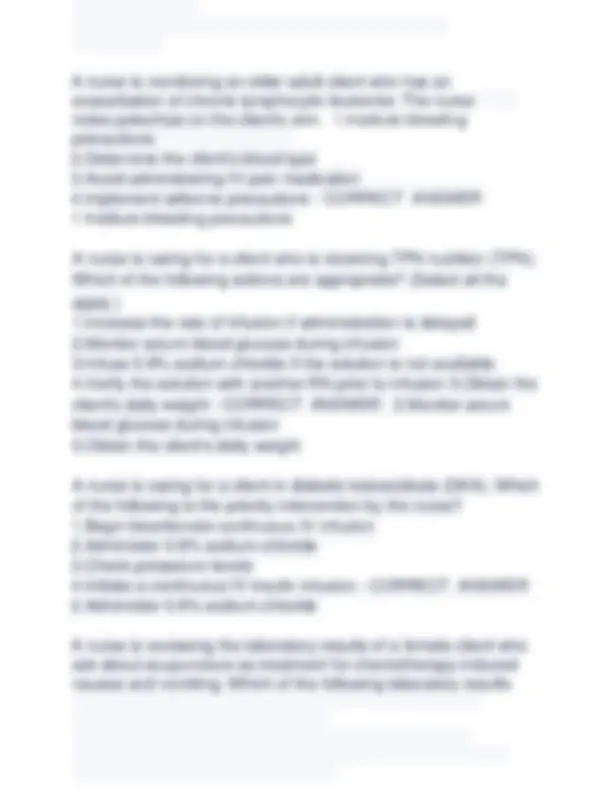
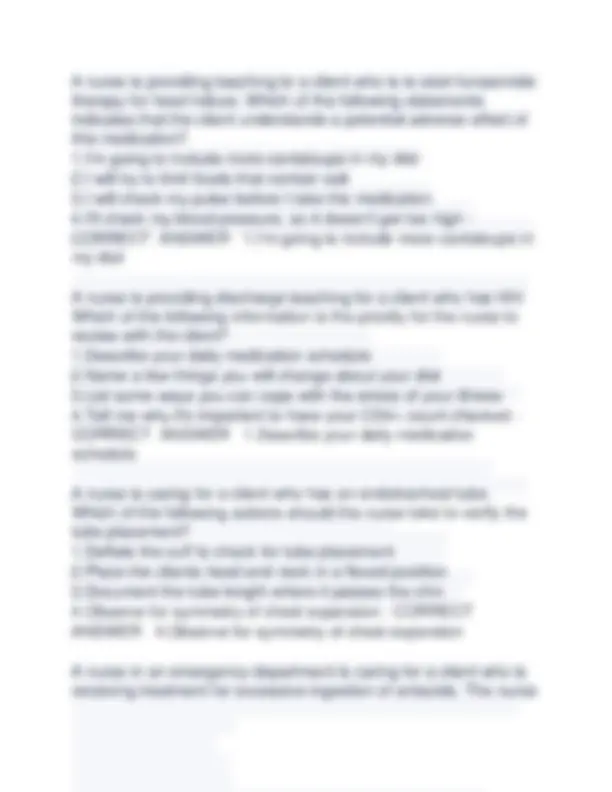
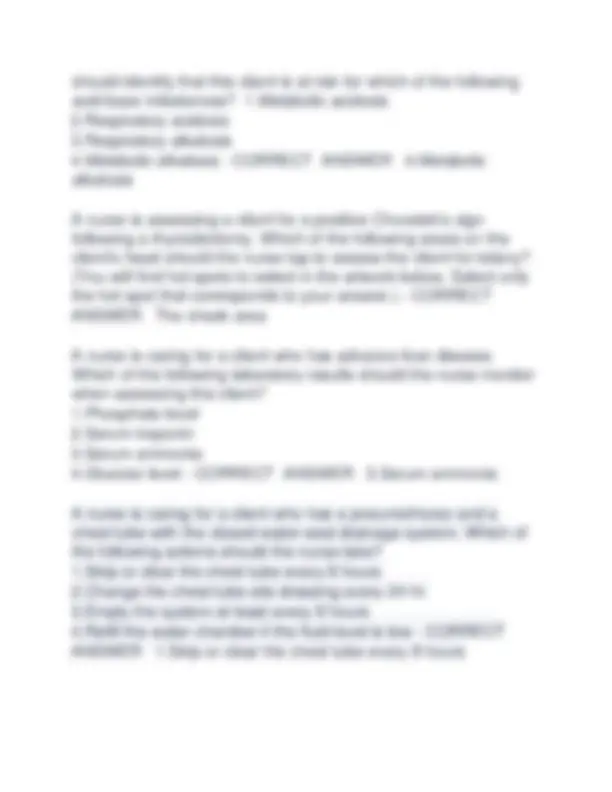
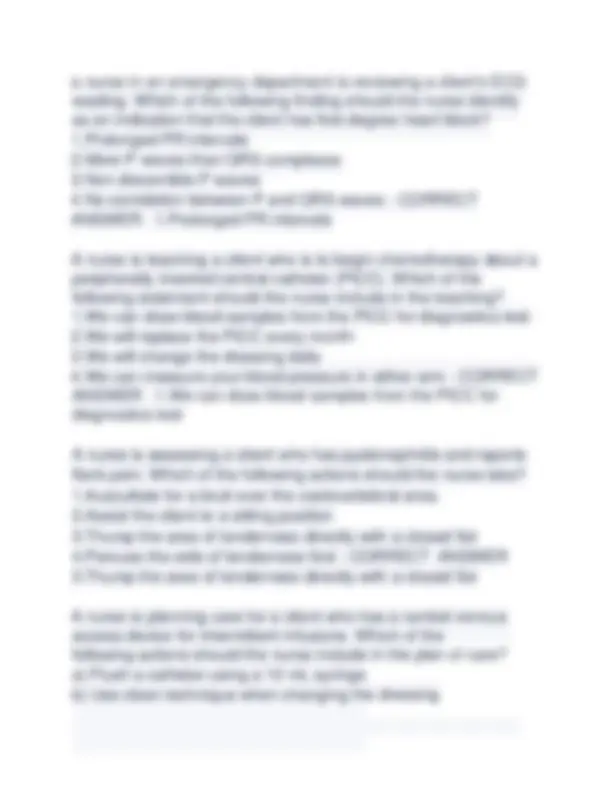
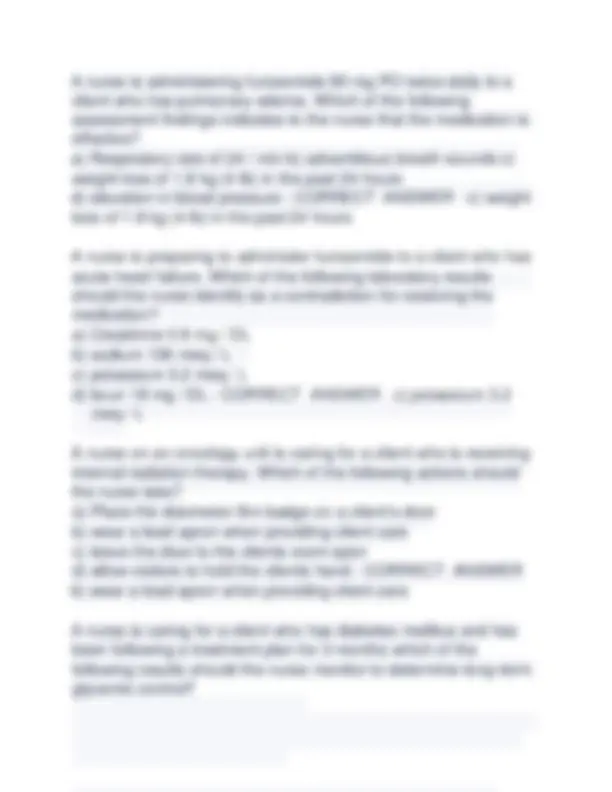
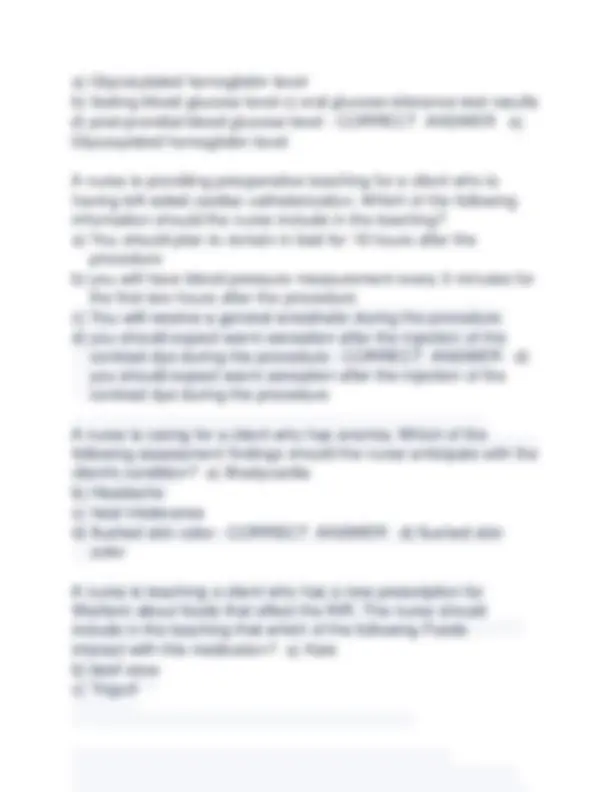
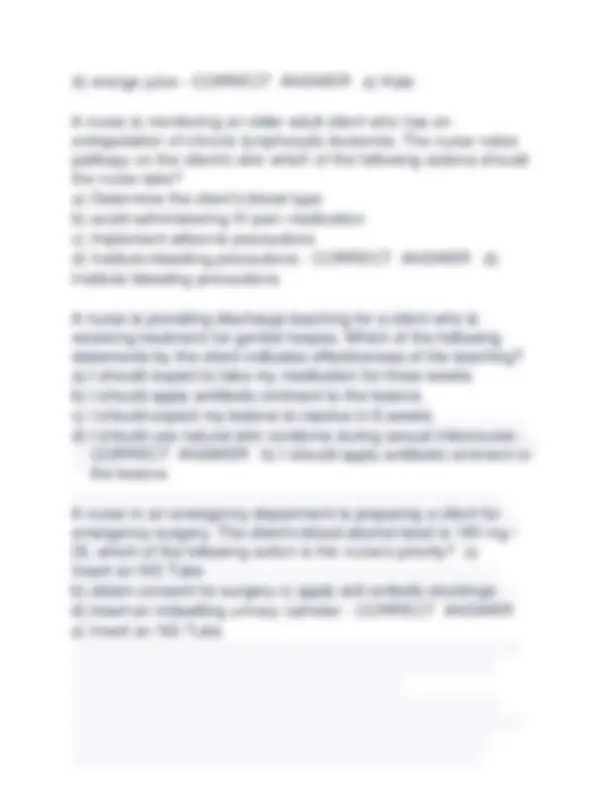
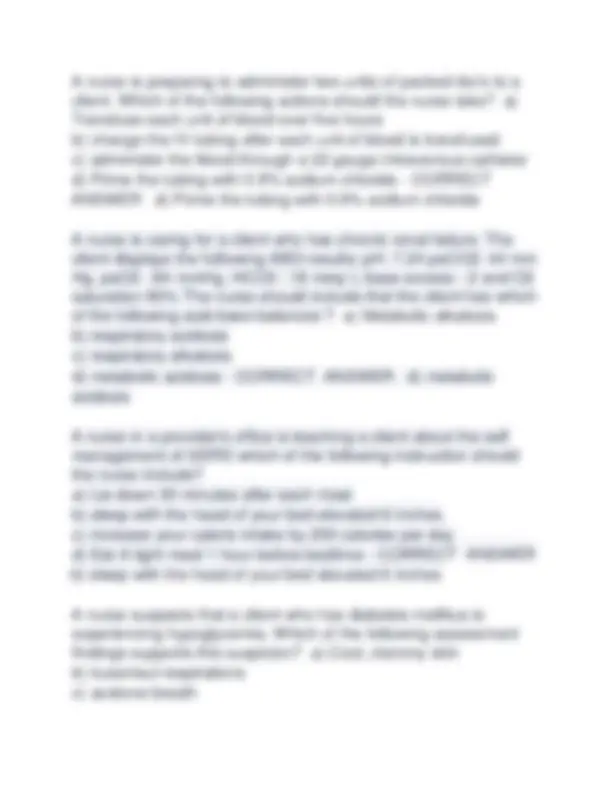
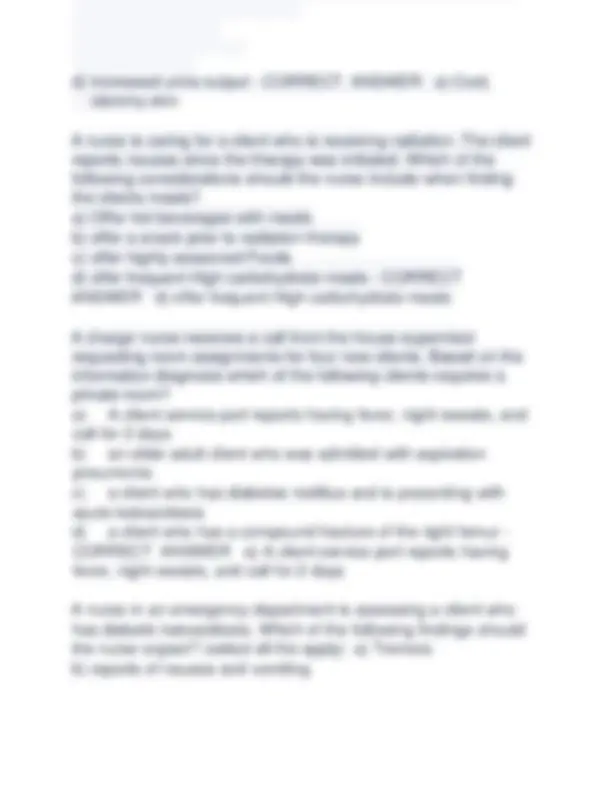
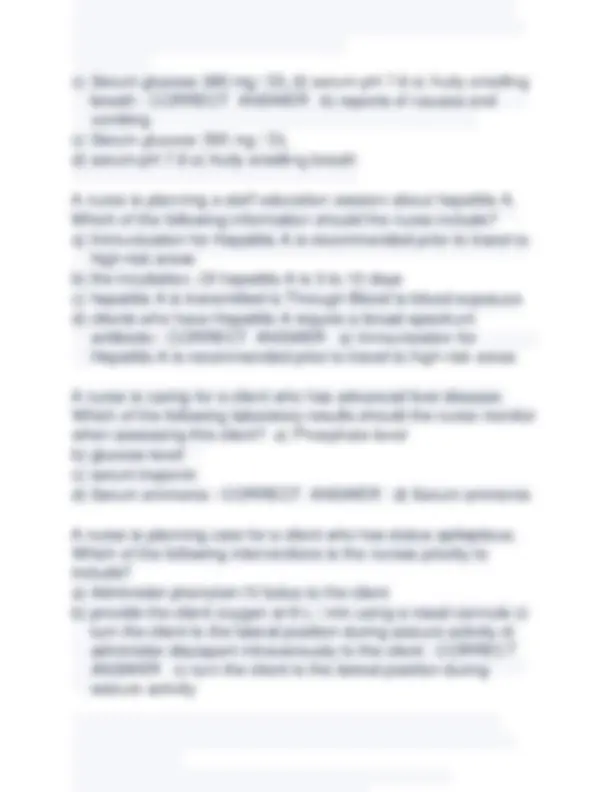
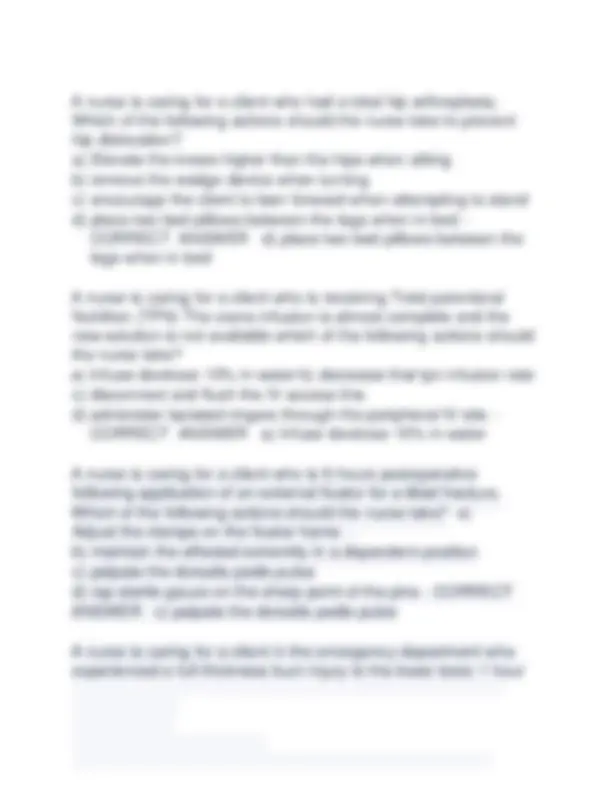
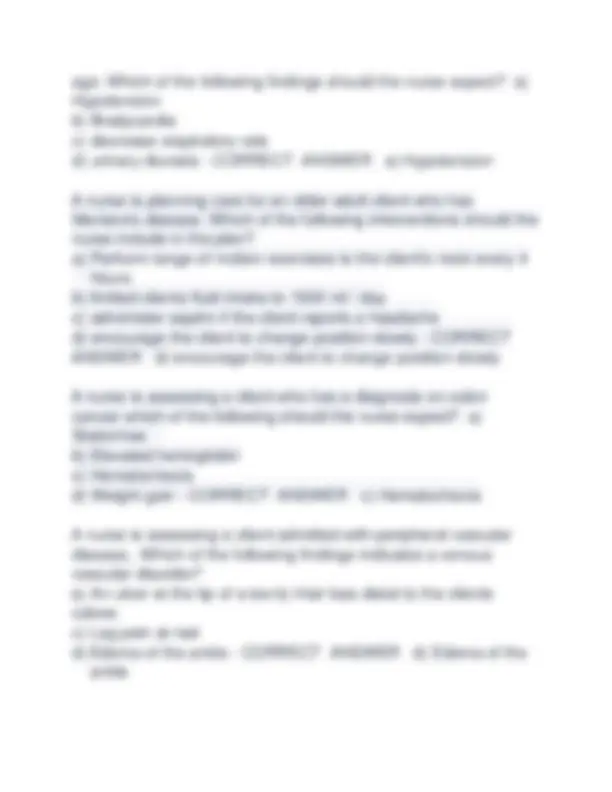
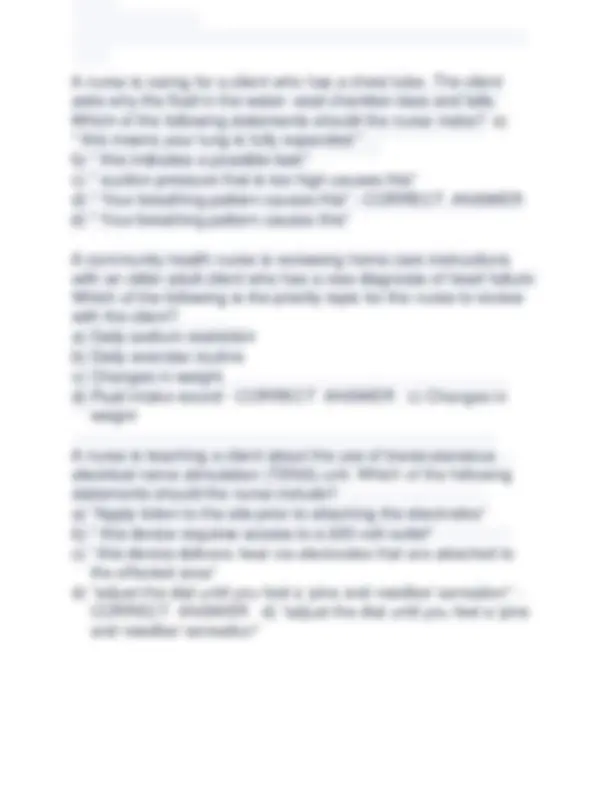
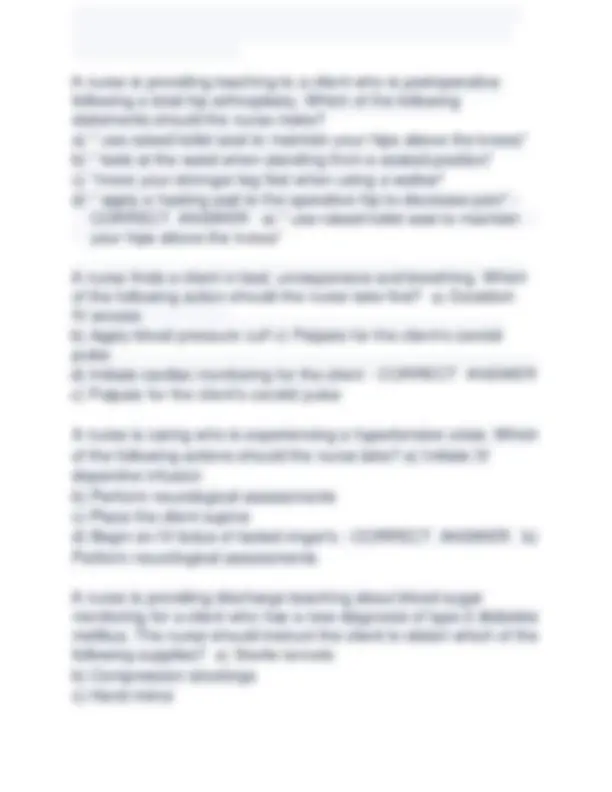
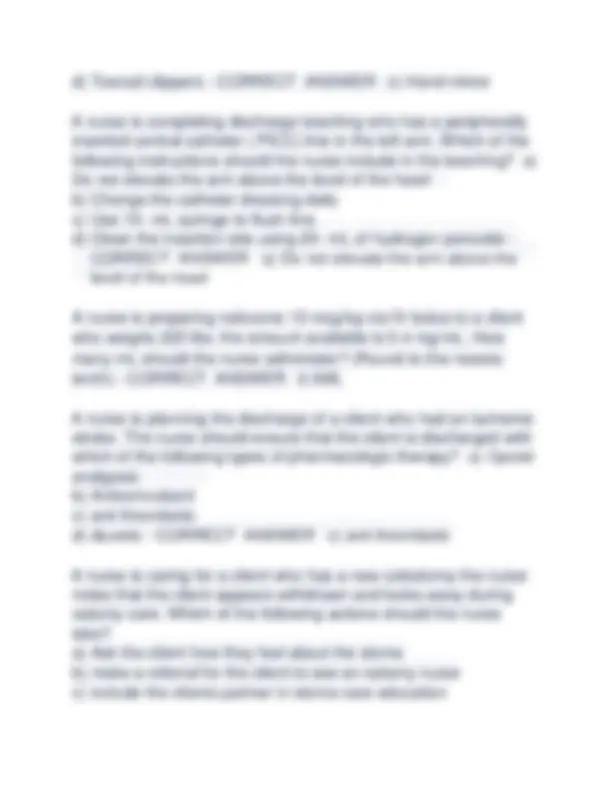
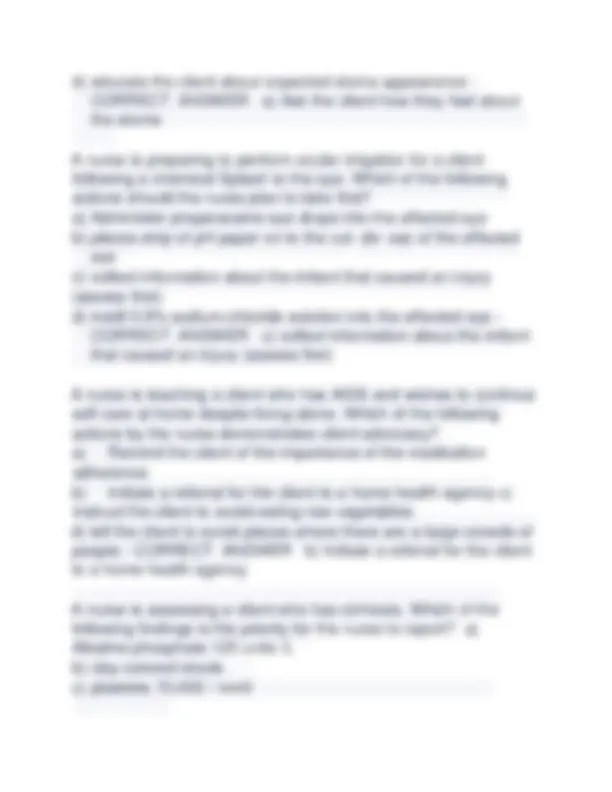
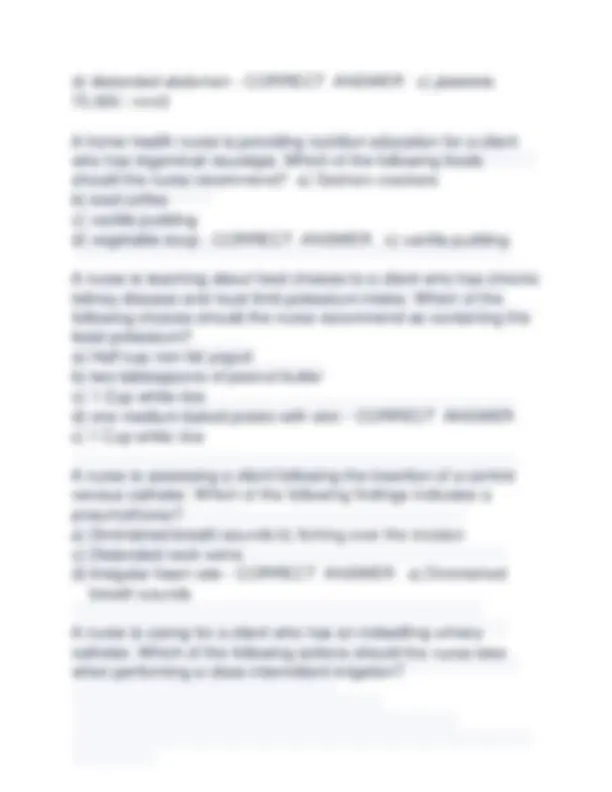
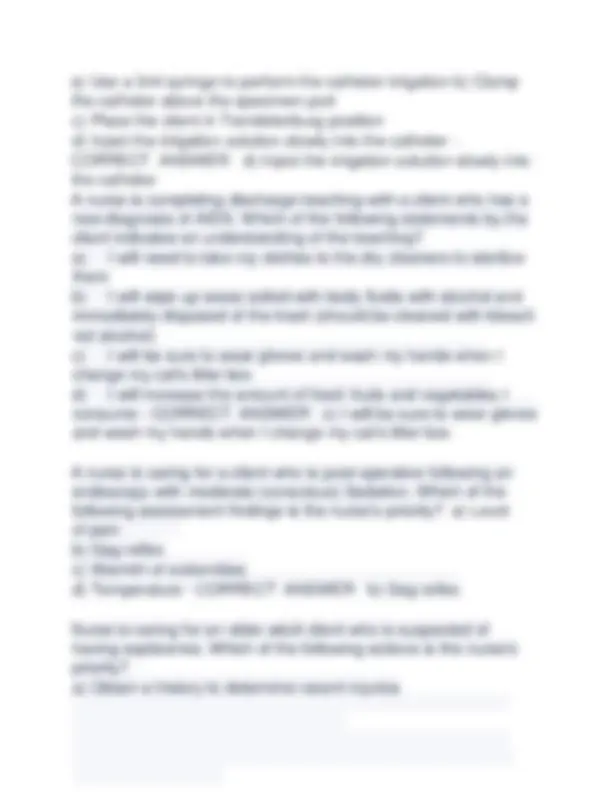
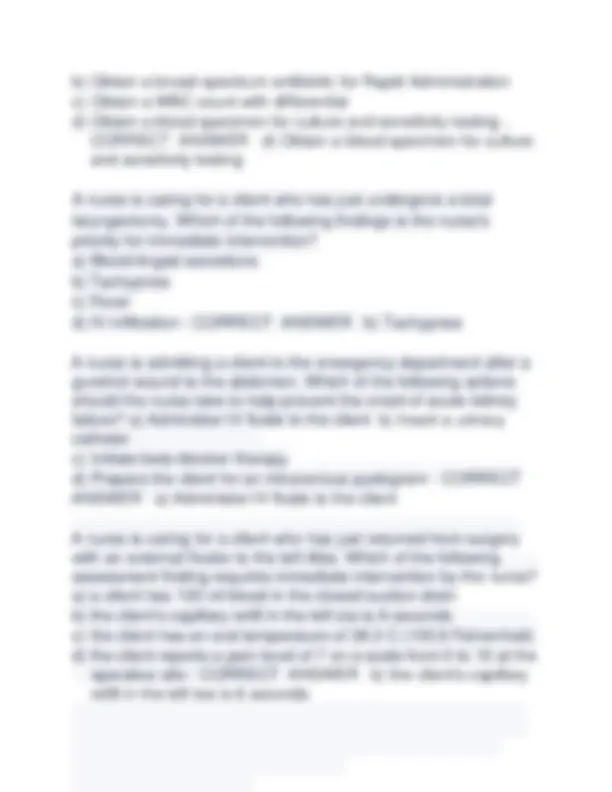
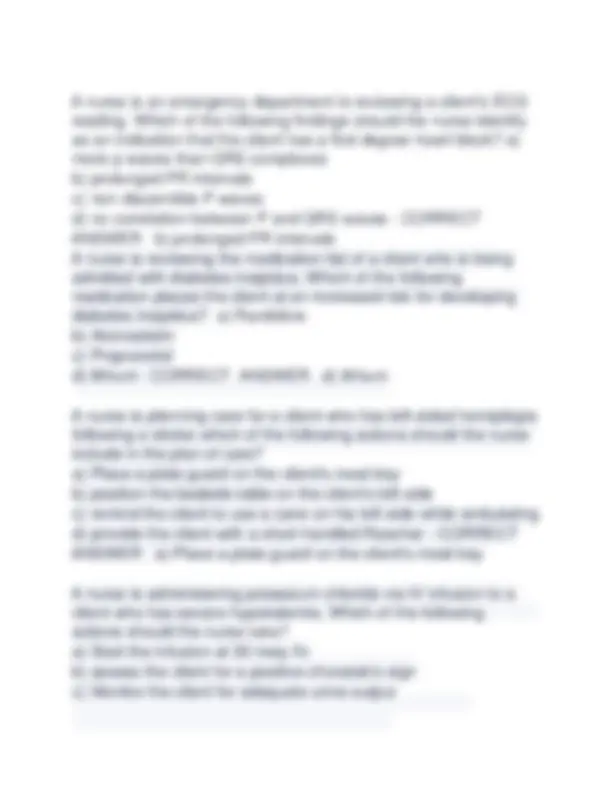
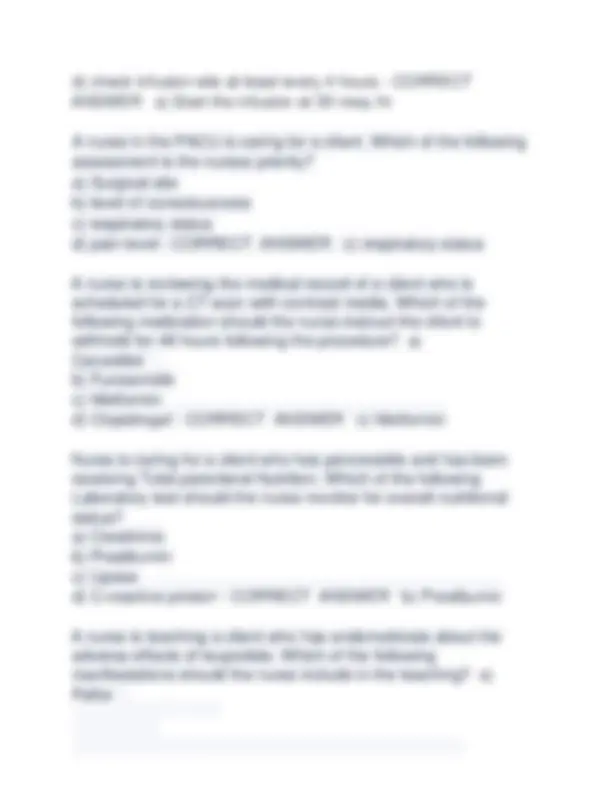
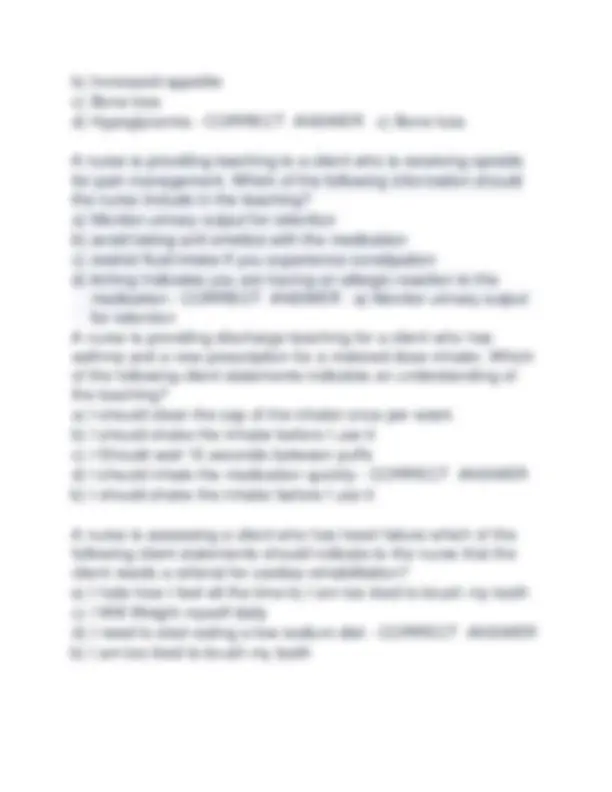
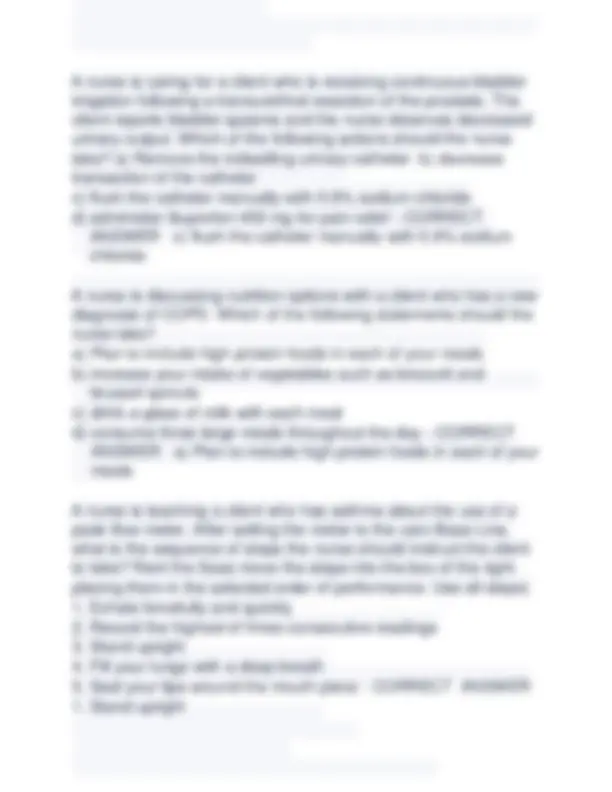
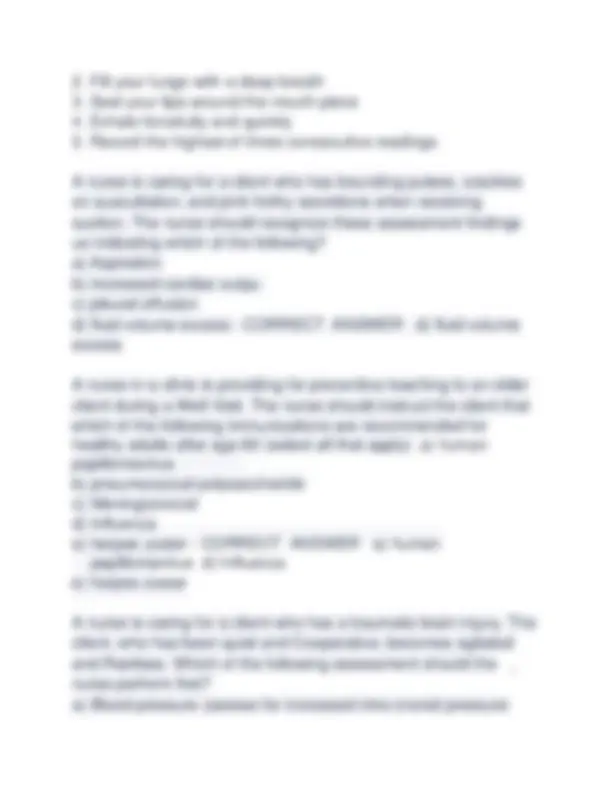
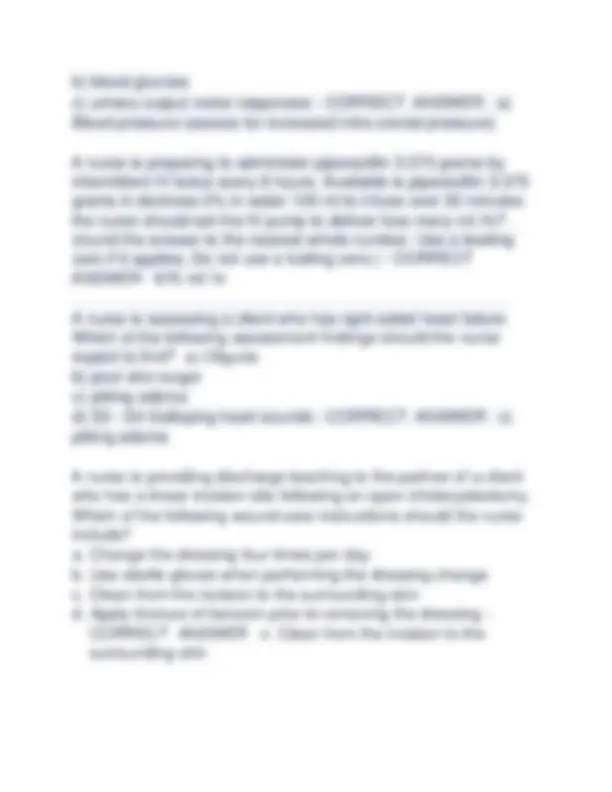
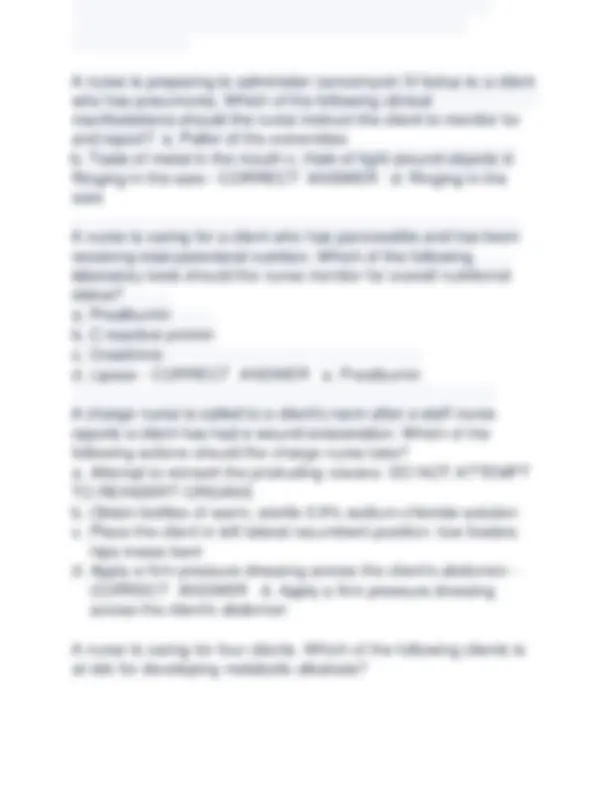
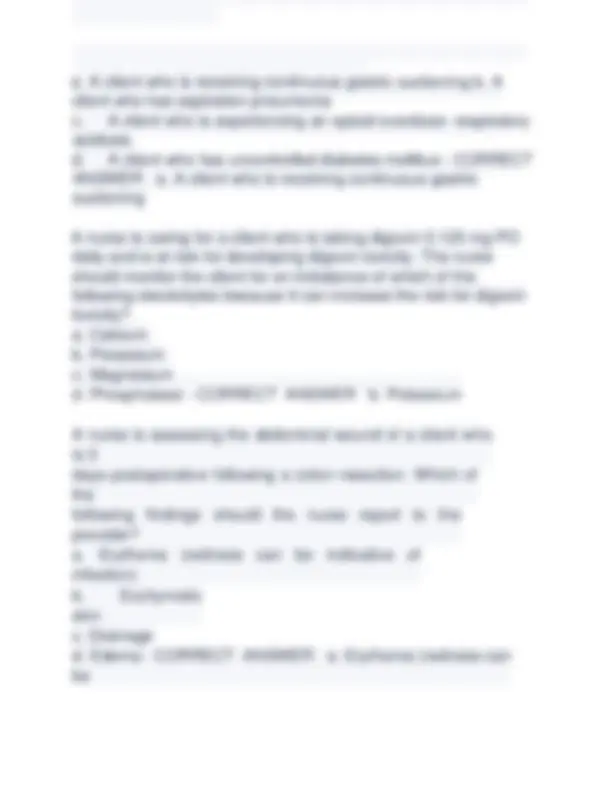
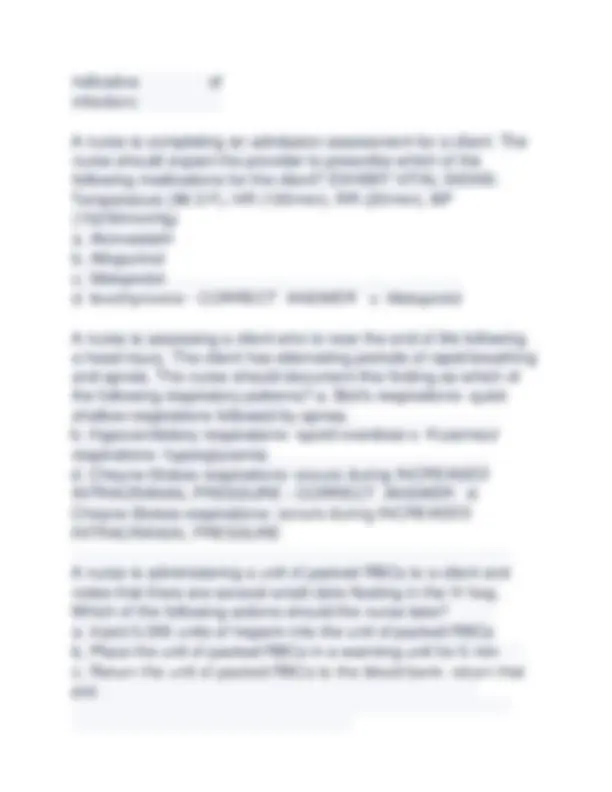
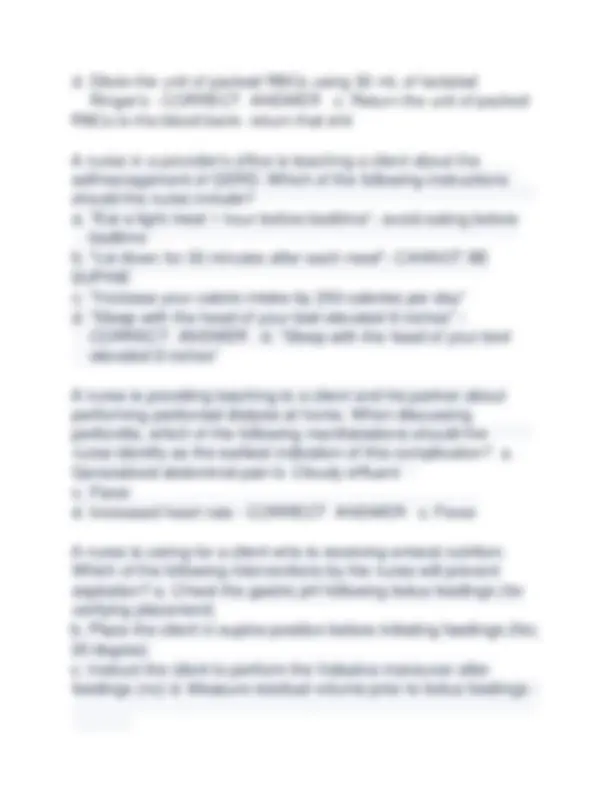
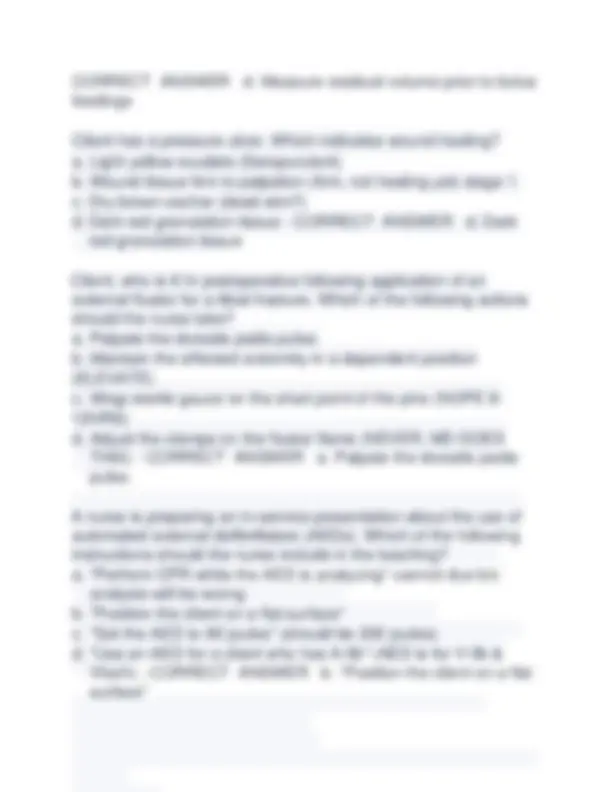
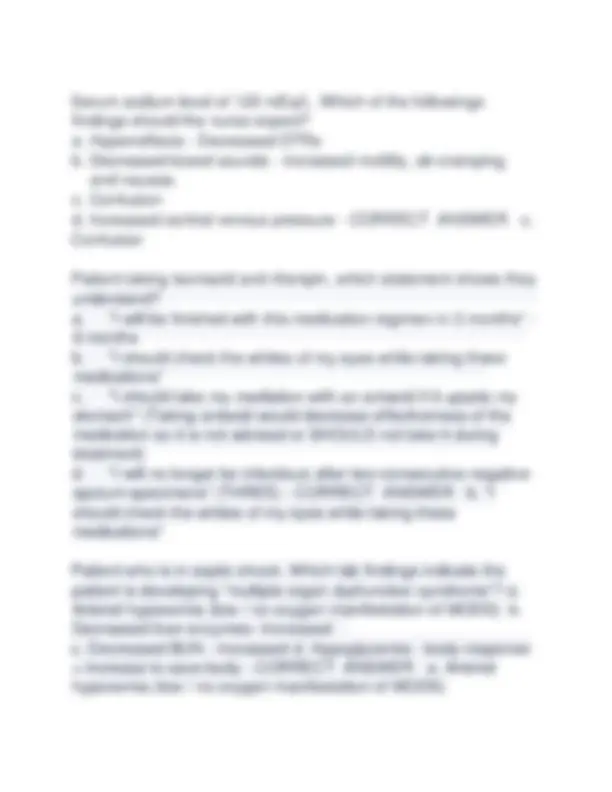
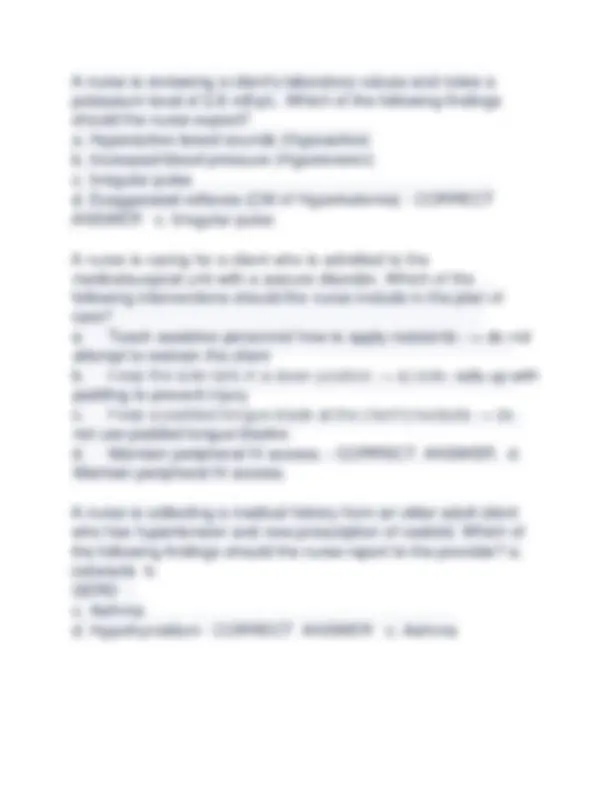
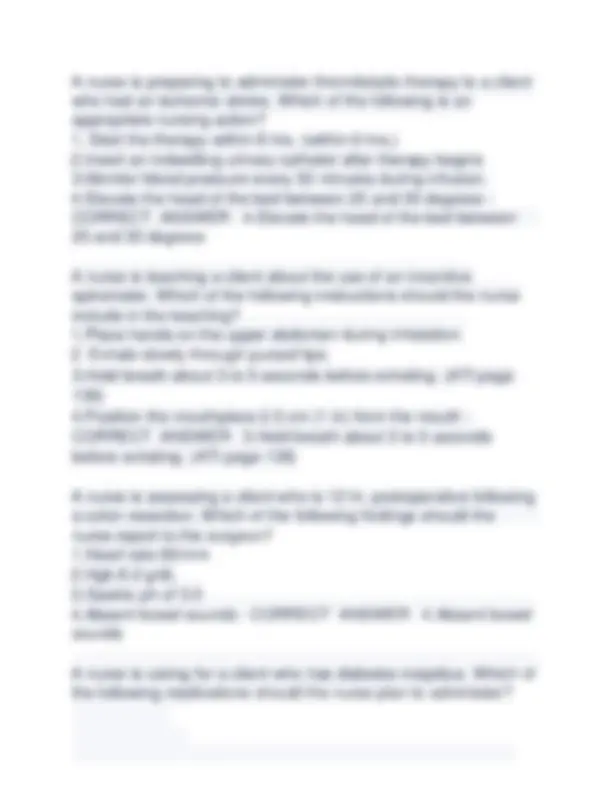
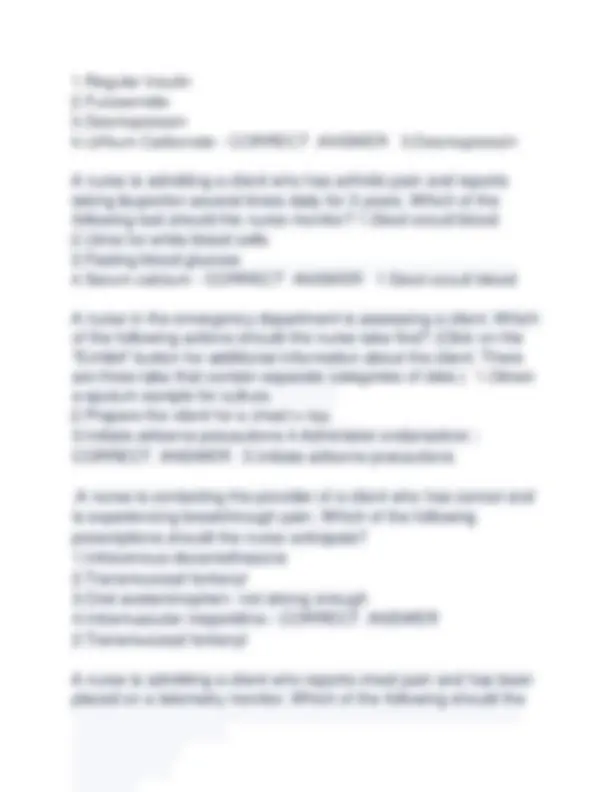
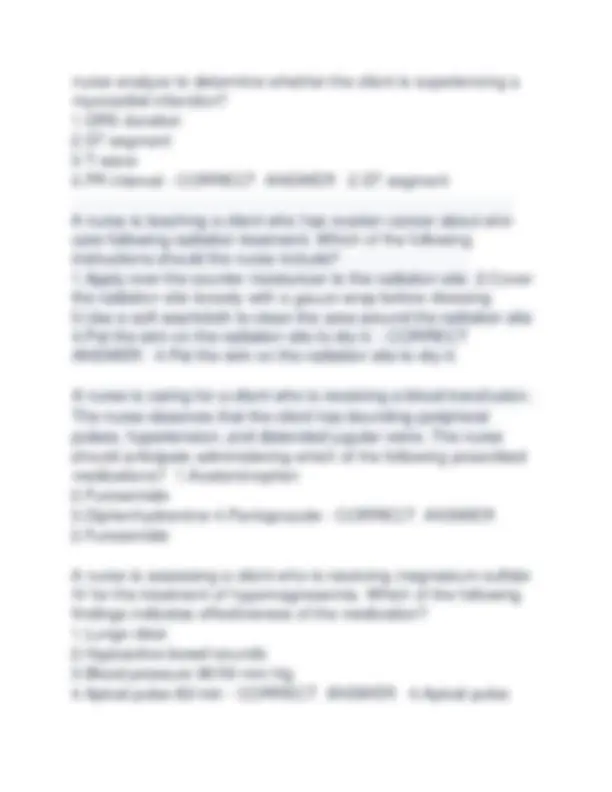
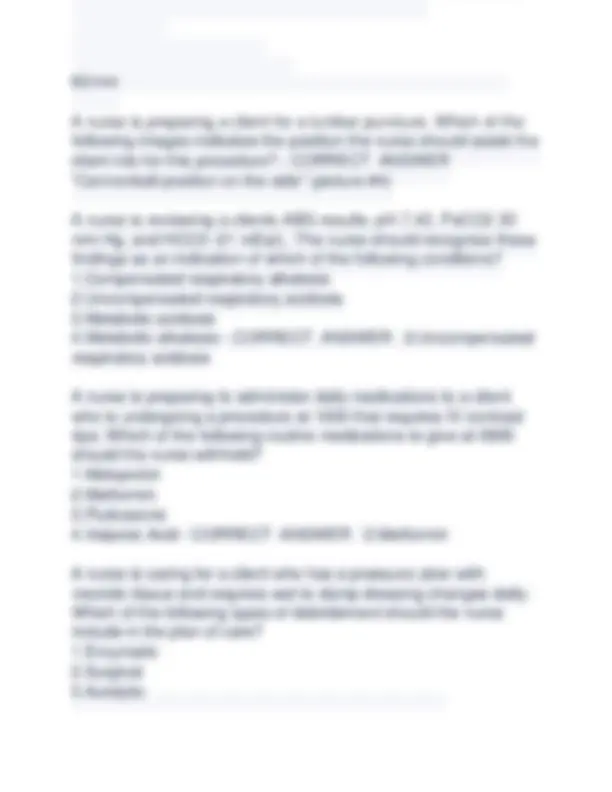
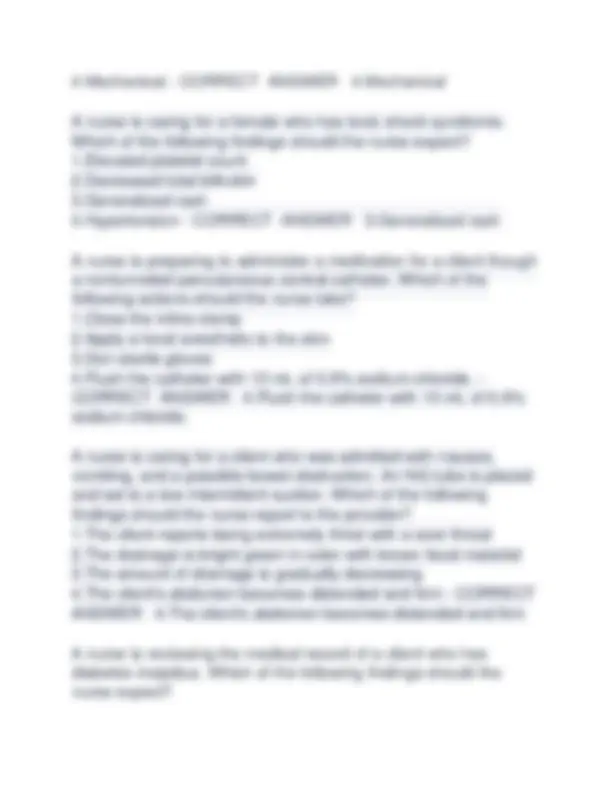
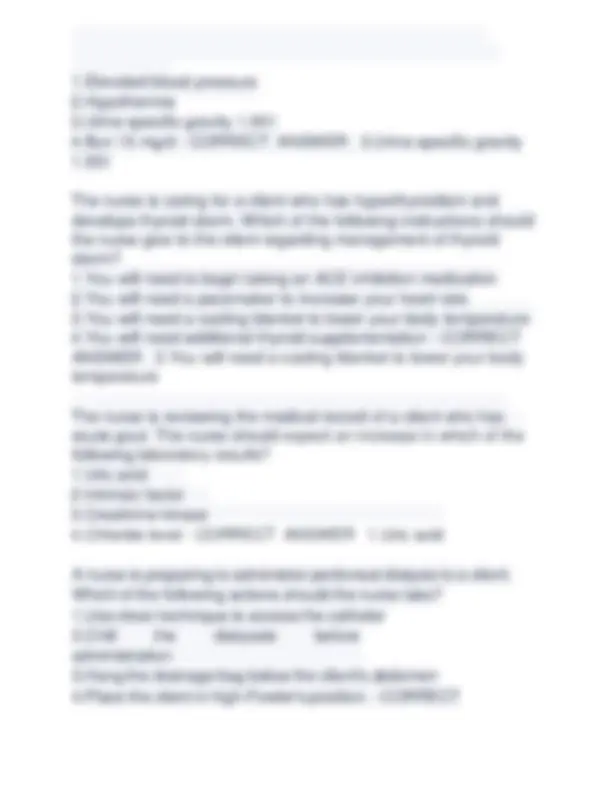
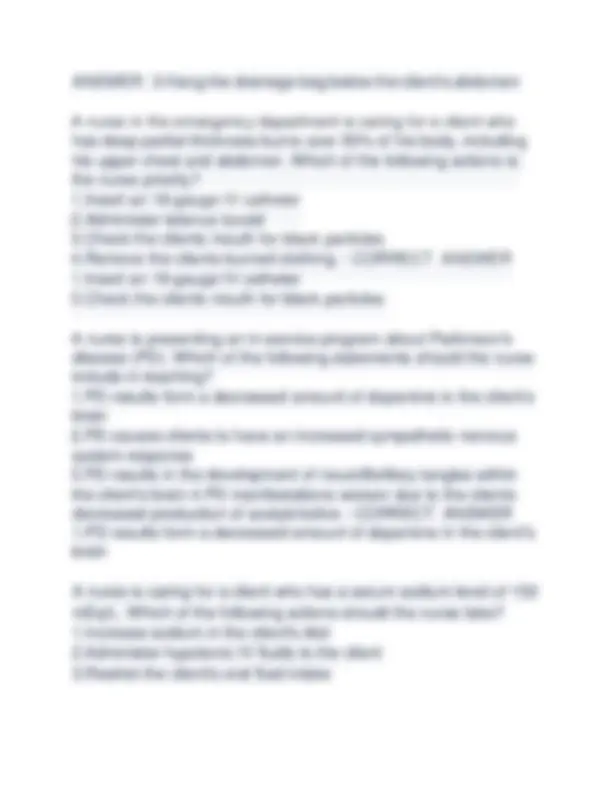
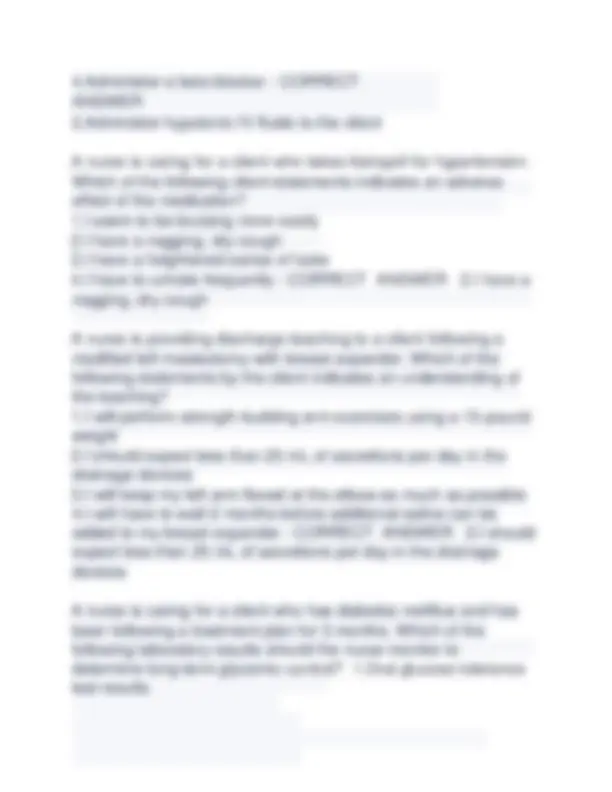
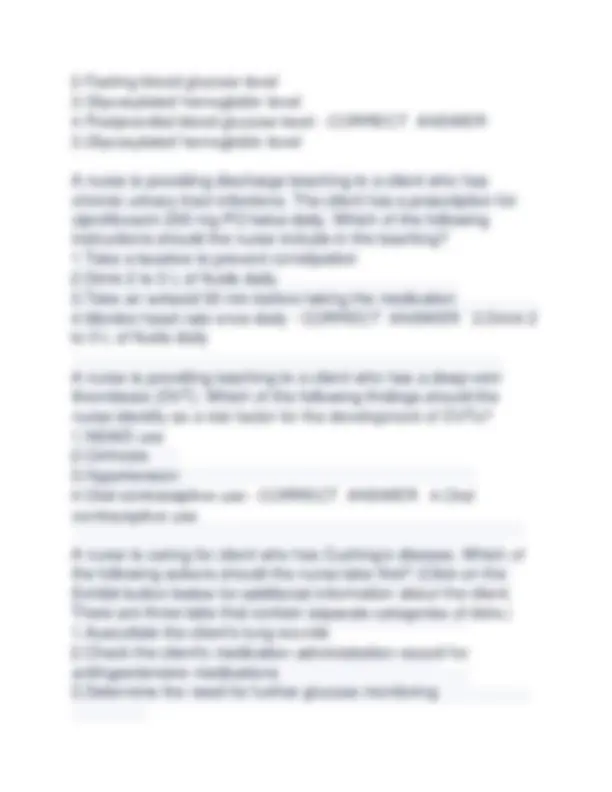
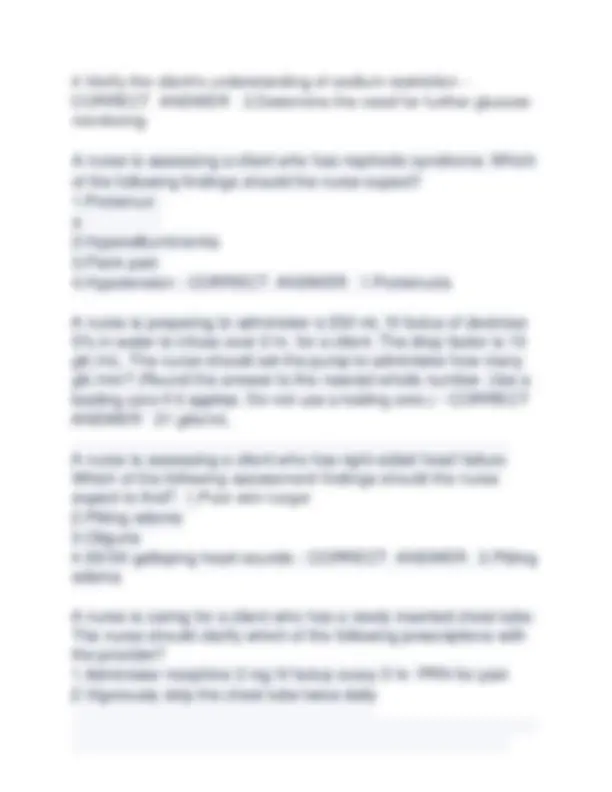
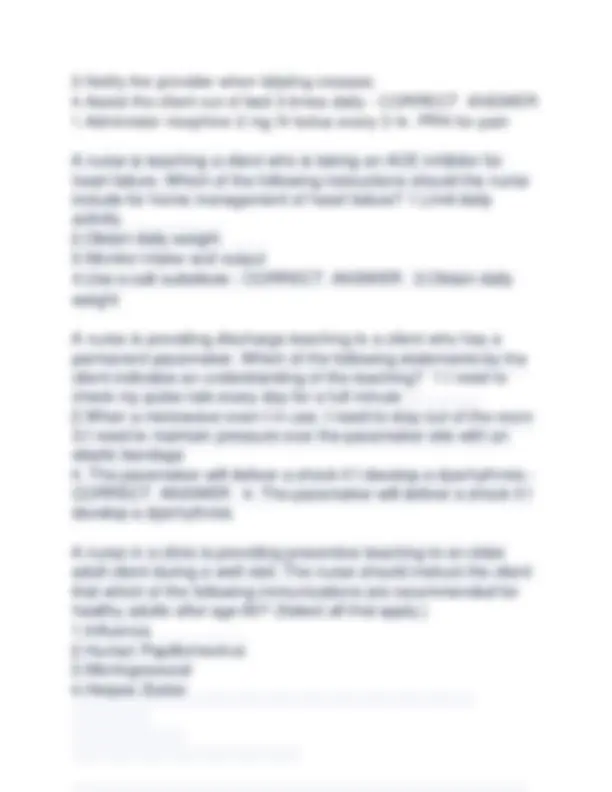
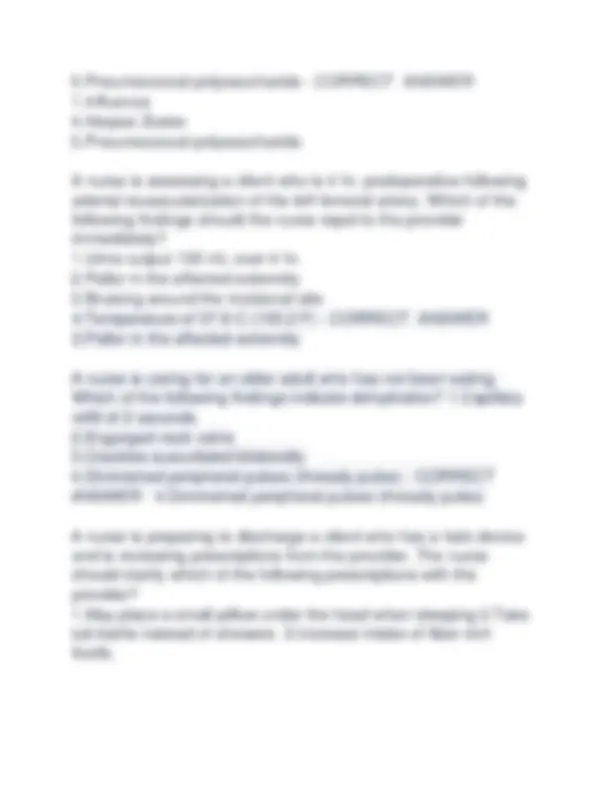
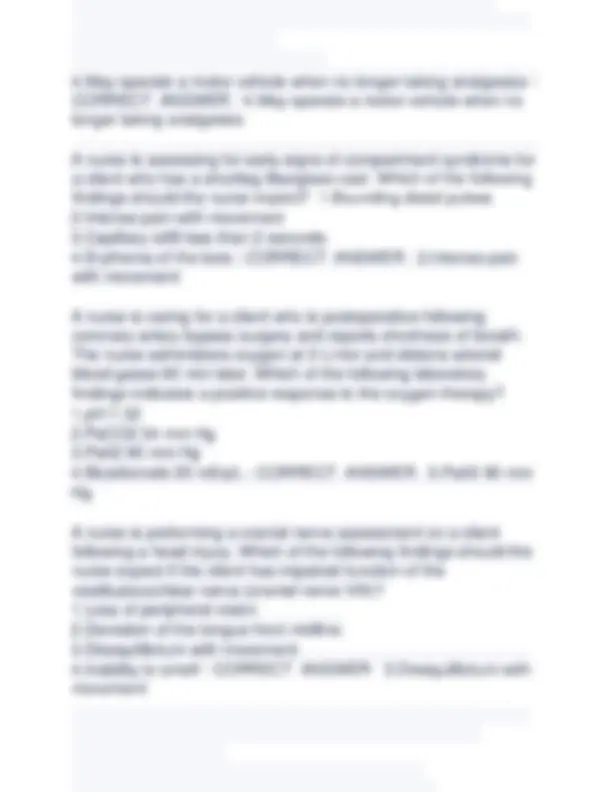
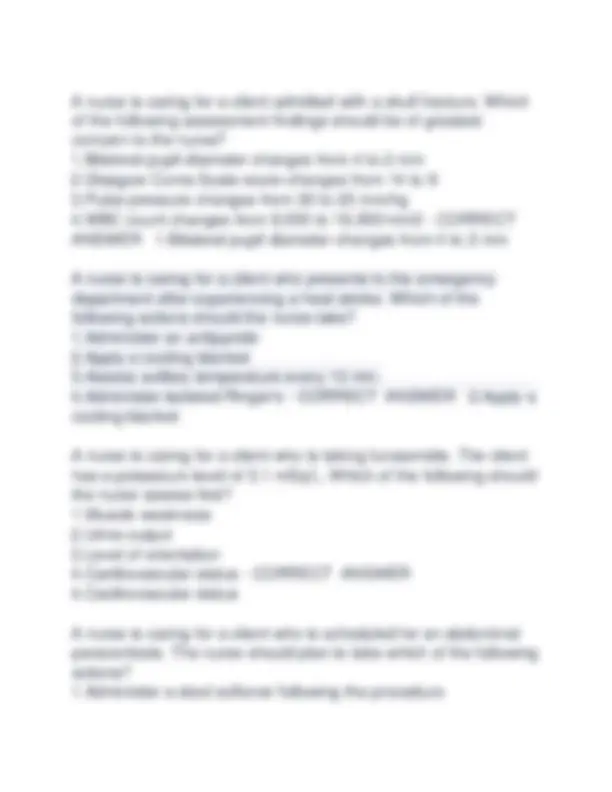
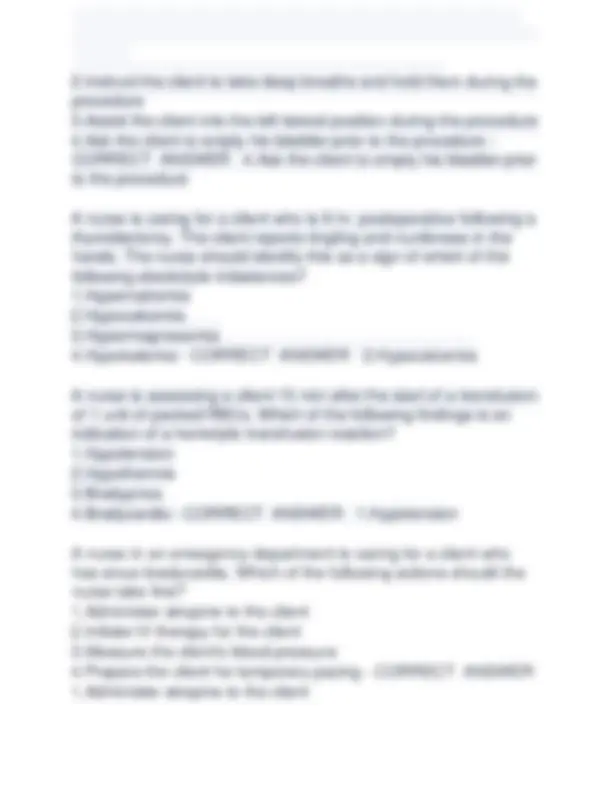
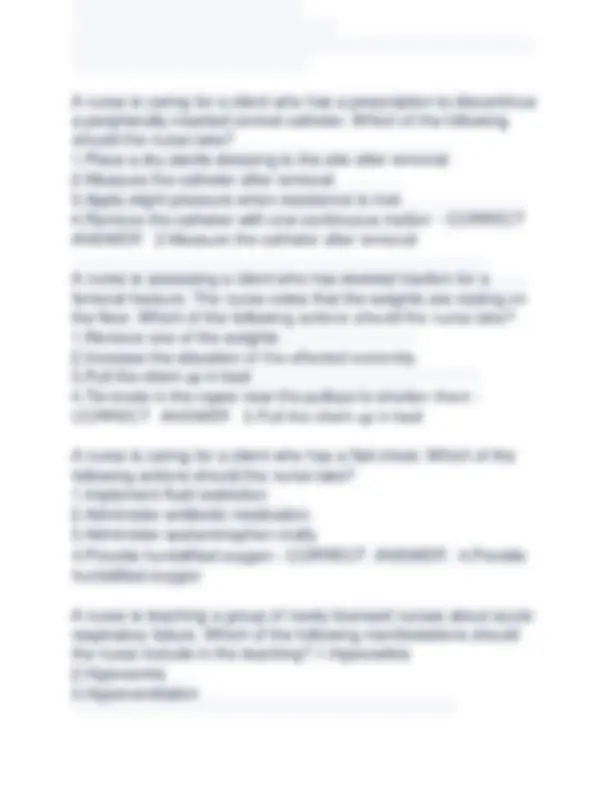
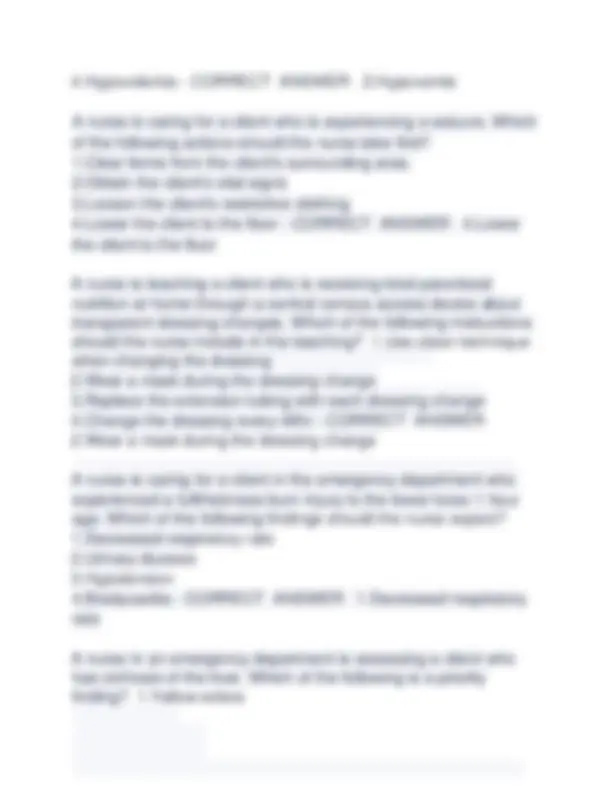
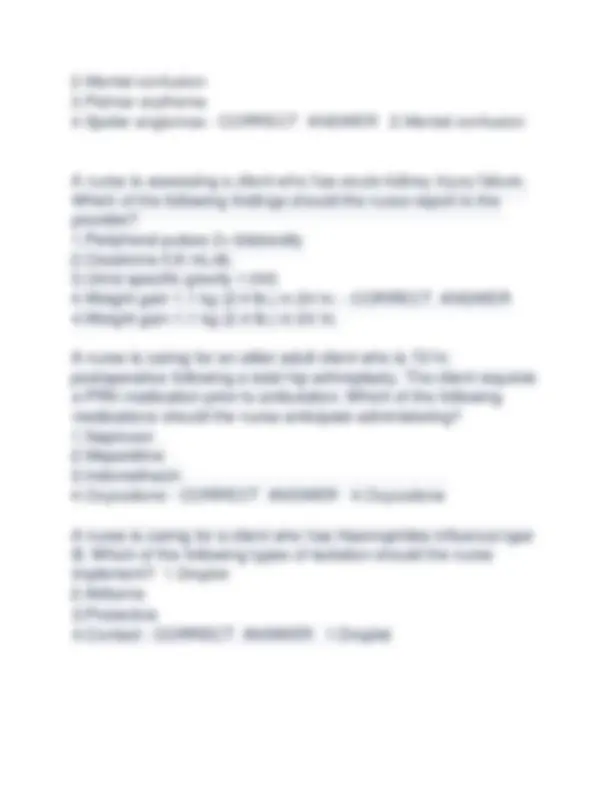
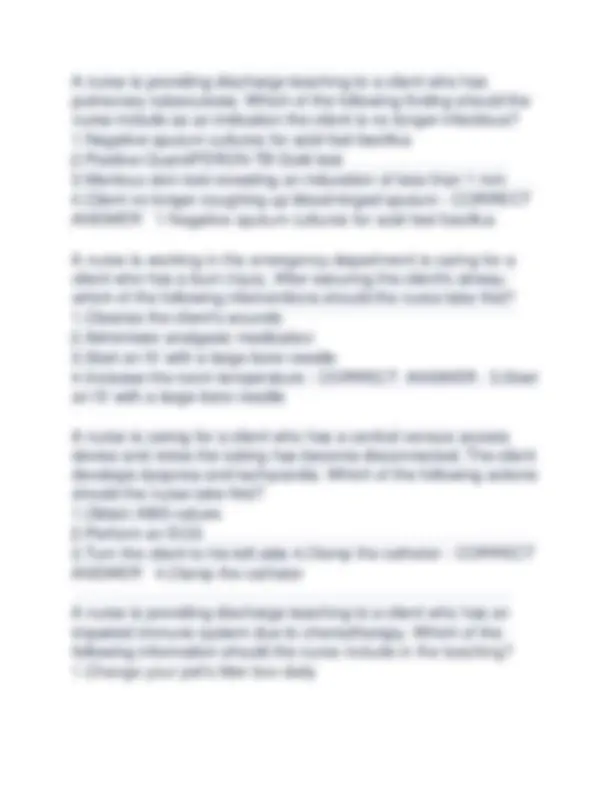
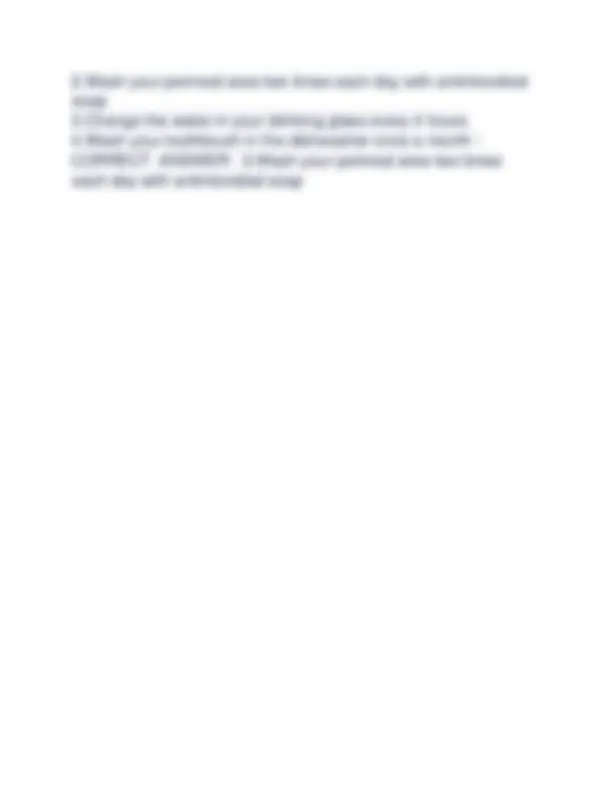


Study with the several resources on Docsity

Earn points by helping other students or get them with a premium plan


Prepare for your exams
Study with the several resources on Docsity

Earn points to download
Earn points by helping other students or get them with a premium plan
Community
Ask the community for help and clear up your study doubts
Discover the best universities in your country according to Docsity users
Free resources
Download our free guides on studying techniques, anxiety management strategies, and thesis advice from Docsity tutors
This document features the most recent and verified real questions with correct answers from the ATI Medical-Surgical Proctored Exam. It thoroughly covers key adult nursing topics including cardiovascular, respiratory, gastrointestinal, neurological, endocrine, and musculoskeletal disorders, as well as patient safety, clinical judgment, and priority setting. Ideal for nursing students preparing for ATI proctored assessments and NCLEX-style testing.
Typology: Exams
1 / 65

This page cannot be seen from the preview
Don't miss anything!


























































A nurse is planning care for a client who has a full-thickness burns on the lower extremities. Which of the following interventions should the nurse include? a) Limit visitation time for client's children to 40 minutes per day b) clean the equipment in the client's room once per week c) provide a diet of fresh fruits and vegetable for the client d) apply new gloves when alternating between wound care sites - CORRECT ANSWER d) apply new gloves when alternating between wound care sites A nurse is caring for a client who has cancer. The client tells the nurse, "I would prefer to try vitamins and minerals instead of chemotherapy" which of the following responses should the nurse make? a) I have never heard of any holistic treatment that is effective b) you should ask your provider about your plan c) the best way to treat your cancer is chemotherapy d) tell me what you know about chemotherapy - CORRECT ANSWER d) tell me what you know about chemotherapy A nurse is planning to teach a client whose provider has prescribed a low purine diet. The nurse should plan to instruct the client that he can include which of the following Foods in his diet (select all that apply) a) Sardines b) Nuts
c) Apricots d) liver e) scallops - CORRECT ANSWER b) Nuts c) Apricots Nurse is caring for a client following a total knee arthroplasty. The client reports a pain level of 6 on a paint scale of 0 to 10. Which of the following interventions should the nurse take? a) Place pillowsl under the clients knee b) gently massage the area around the clients incision c) apply an ice pack to the clients knee d) perform range of motion exercises to the clients knee - CORRECT ANSWER c) apply an ice pack to the clients knee A nurse is caring for a client who has lower extremity fracture and a prescription for crutches. Which of the following client statements indicates that the client is adapting to their role change? a) I will need to have my partner take over shopping for groceries and cooking the meals for us b) Its going to be difficult to tell my parents I can't take them to their appointments anymore c) I feel bad that I have to ask my partner to keep the house clean d) These crutches will make it impossible to care for my child - CORRECT ANSWER a) I will need to have my partner take over shopping for groceries and cooking the meals for us A nurse is assessing a client who is preoperative and reports an allergy to bananas. The nurse should recognize that the client is at risk for an allergic cross-reactivity to which of the following substances? a) adhesive tape b) Latex
nurse identify as a risk factor for the development of the DVTs? a) NSAID use b) hypertension c) oral contraceptive use d) cirrhosis - CORRECT ANSWER c) oral contraceptive use A nurse is caring for a client who has a sealed radiation implant. Which of the following actions should the nurse take? a) Remove soiled linens from the room after each change b) Give the dosimeter badge to the oncoming nurse at the end of the shift c) Apply a second pair of gloves before touching the client's implant if it dislodges d) Limit family member visits to 30 min per day - CORRECT ANSWER d) Limit family member visits to 30 min per day A nurse is providing teaching to a client and his partner about performing peritoneal dialysis at home. When discussing peritonitis, which of the following manifestations should the nurse identify as the earliest indication of this complication? a) Generalized abdominal pain b) Cloudy effluent c) Increased heart rate d) Fever - CORRECT ANSWER d) Fever A nurse is caring for a client who is receiving a blood transfusion. The nurse observes that the client has bounding peripheral pulses, hypertension, and distended jugular veins. The nurse should anticipate administering which of the following prescribed medications? a) Pantoprazole b) Acetaminophen c) Furosemide
d) Diphenhydramine - CORRECT ANSWER c) Furosemide A nurse is planning care for a client who has upper gastrointestinal bleeding due to a peptic ulcer. Which of the following actions should the nurse plan to take? a) Provide ketorolac for abdominal pain b) Administer nitroprusside IV based on the client's weight c) Insert a large bore nasogastric tube d) Ensure that the client has a 22- gauge iv line in place - CORRECT ANSWER c) Insert a large bore nasogastric tube A nurse is caring for a client who has bladder cancer and a WBC count of 900/mm3. Which of the following actions should the nurse take? a) Instruct client to avoid eating raw fruit b) Move the client to a negative pressure room c) Use contact isolation while providing care d) Apply pressure to venipuncture sites for 10 min - CORRECT ANSWER a) Instruct client to avoid eating raw fruit A nurse is caring for a patient who has hypotension, cool and clammy skin, tachycardia and tachypnea. Which of the following positions should the nurse place the client? a) Reverse Trendelenburg b) Feet elevated c) Side lying d) High - fowler's - CORRECT ANSWER a) Reverse Trendelenburg A nurse is caring for a client who weighs 190 lb and is receiving Total parenteral Nutrition. If the RDA Protein is 0.8g/kg of body
1.Exhale fully before bringing the inhaler to your lips A nurse is admitting a client to the emergency department after a gunshot wound to the abdomen. Which of the following actions should the nurse take to help prevent the onset of acute kidney failure? 1.Imitate beta blocker therapy 2.Administer IV fluids to the client 3.Insert a urinary catheter 4.Prepare the client for an intravenous pyelogram - CORRECT ANSWER 2.Administer IV fluids to the client A nurse is completing an assessment of an older adult client and notes reddened areas over the bony prominences, but the client's skin is intact. Which of the following interventions should the nurse include in the plan of care? 1.Massage the reddened areas three times daily 2.Turn and reposition the client every 4 hr. 3.Support bony prominences with pillows 4.Apply an occlusive dressing - CORRECT ANSWER 3.Support bony prominences with pillows A nurse is reviewing the medical record of a client who is to undergo open heart surgery. Which of the following findings should the nurse report to the provider as a contraindication to receive heparin? 1.Thrombocytopenia 2.COPD 3.Thalassemia 4.Rheumatoid arthritis - CORRECT ANSWER 1.Thrombocytopenia A nurse is caring for a client who as completed 10 daily cycles of total parenteral nutrition (TPN). Which of the following findings
indicates that the client is receiving adequate TPN supplementation? 1.Weight gain of 9.1 kg (20 lb.) 2.BUN level of 15 mg/dL 3.Improved mobility 4.Potassium level of 2.5 mEq/L - CORRECT ANSWER 1.Weight gain of 9.1 kg (20 lb.) A nurse is providing teaching to a client who is postoperative following a partial glossectomy. Which of the following statements by the client indicates an understanding of the teaching?
1.I will inspect my mouth once each week for sores 2.I will drink orange juice to increase my vitamin C intake 3.I will consume canned soap whenever sores appear in my mouth 4.I will rinse my toothbrush with hydrogen peroxide and water after each use - CORRECT ANSWER 1.I will inspect my mouth once each week for sores A nurse is preforming an ear irrigation for a client. Which of the following actions should the nurse take? 1.Use cool fluid for irrigation 2.Insert the tip of the syringe 2.5 cm (1 in) into the ear canal 3.Tilt the client's head 45 degrees 4.Point the tip of the syringe toward the top of the ear canal - CORRECT ANSWER 4.Point the tip of the syringe toward the top of the ear canal A nurse is caring for a client who is receiving continuous bladder irrigation following a transurethral resection of the prostate
A nurse is monitoring an older adult client who has an exacerbation of chronic lymphocytic leukemia. The nurse notes petechiae on the client's skin. 1.Institute bleeding precautions 2.Determine the client's blood type 3.Avoid administering IV pain medication 4.Implement airborne precautions - CORRECT ANSWER 1.Institute bleeding precautions A nurse is caring for a client who is receiving TPN nutrition (TPN). Which of the following actions are appropriate? (Select all that apply.) 1.Increase the rate of infusion if administration is delayed 2.Monitor serum blood glucose during infusion 3.Infuse 0.9% sodium chloride if the solution is not available 4.Verify the solution with another RN prior to infusion 5.Obtain the client's daily weight - CORRECT ANSWER 2.Monitor serum blood glucose during infusion 5.Obtain the client's daily weight A nurse is caring for a client in diabetic ketoacidosis (DKA). Which of the following is the priority intervention by the nurse? 1.Begin bicarbonate continuous IV infusion 2.Administer 0.9% sodium chloride 3.Check potassium levels 4.Initiate a continuous IV insulin infusion - CORRECT ANSWER 2.Administer 0.9% sodium chloride A nurse is reviewing the laboratory results of a female client who ask about acupuncture as treatment for chemotherapy-induced nausea and vomiting. Which of the following laboratory results
should the nurse identify as a contraindication to receiving acupuncture? 1.Hemoglobin 12 g/dL 2.C-reactive protein 0.7 mg/dL 3.Platelets 160,000/mm 4.Absolute neutrophil count 500/mm3 - CORRECT ANSWER 4.Absolute neutrophil count 500/mm A nurse is caring for a client following a total knee arthroplasty. The client reports a pain level of 6 on a pain scale of 0 to 10. Which of the following interventions should the nurse take? 1 .Gently massage the area around the client's incision 2.Apply an ice pack to the client's knee 3.Perform range of motion exercises to the client's knee 4.Place pillows under the client's knee - CORRECT ANSWER 2.Apply an ice pack to the client's knee A nurse is assessing a client who has heart failure and is receiving a loop diuretic. Which of the following findings indicates hypokalemia? 1.Muscle weakness 2.Hypertension 3.Positive chvostek sign 4.Oliguria - CORRECT ANSWER 1.Muscle weakness A nurse at a long-term facility is assessing an older adult client. Which of the following findings should the nurse identify as an indication that the client has a recall memory impairment? 1.Inability to state his current age 2.Inability to name the members of his family 3.Inability to count backwards from 10 4.Inability to state what he had for dinner last night - CORRECT ANSWER 4.Inability to state what he had for dinner last night
A nurse is providing teaching to a client who is to start furosemide therapy for heart failure. Which of the following statements indicates that the client understands a potential adverse effect of this medication? 1.I'm going to include more cantaloupe in my diet 2.I will try to limit foods that contain salt 3.I will check my pulse before I take the medication 4.I'll check my blood pressure, so it doesn't get too high - CORRECT ANSWER 1.I'm going to include more cantaloupe in my diet A nurse is providing discharge teaching for a client who has HIV. Which of the following information is the priority for the nurse to review with the client? 1.Describe your daily medication schedule 2.Name a few things you will change about your diet 3.List some ways you can cope with the stress of your illness 4.Tell me why it's important to have your CD4+ count checked - CORRECT ANSWER 1.Describe your daily medication schedule A nurse is caring for a client who has an endotracheal tube. Which of the following actions should the nurse take to verify the tube placement? 1.Deflate the cuff to check for tube placement 2.Place the clients head and neck in a flexed position 3.Document the tube length where it passes the chin 4.Observe for symmetry of chest expansion - CORRECT ANSWER 4.Observe for symmetry of chest expansion A nurse in an emergency department is caring for a client who is receiving treatment for excessive ingestion of antacids. The nurse
should identify that this client is at risk for which of the following acid-base imbalances? 1.Metabolic acidosis 2.Respiratory acidosis 3.Respiratory alkalosis 4.Metabolic alkalosis - CORRECT ANSWER 4.Metabolic alkalosis A nurse is assessing a client for a positive Chvostek's sign following a thyroidectomy. Which of the following areas on the client's head should the nurse tap to assess the client for tetany? (You will find hot spots to select in the artwork below. Select only the hot spot that corresponds to your answer.) - CORRECT ANSWER The cheek area A nurse is caring for a client who has advance liver disease. Which of the following laboratory results should the nurse monitor when assessing this client? 1.Phosphate level 2.Serum troponin 3.Serum ammonia 4.Glucose level - CORRECT ANSWER 3.Serum ammonia A nurse is caring for a client who has a pneumothorax and a chest tube with the closed water-seal drainage system. Which of the following actions should the nurse take? 1.Strip or clear the chest tube every 8 hours 2.Change the chest tube site dressing every 24 hr. 3.Empty the system at least every 8 hours 4.Refill the water chamber if the fluid level is low - CORRECT ANSWER 1.Strip or clear the chest tube every 8 hours
c) Cleanse the site with Provo dine iodine d) Change the dressing every 24 hours - CORRECT ANSWER a) Flush a catheter using a 10 mL syringe A nurse is reviewing the medical record of a client who is to undergo open heart surgery. Which of the following findings should the nurse report to the provider as a contradiction to receiving heparin? a) Thalassemia b) Rheumatoid arthritis c) COPD d) Thrombocytopenia - CORRECT ANSWER d) Thrombocytopenia A nurse is caring for an older adult client who has dementia. Which of the following question should the nurse ask to assess the client's abstract thinking? a) What is meant by saying "don't beat around the bush?" b) What do you understand about your condition? c) Can you count backwards from 100 in intervals of 7? d) Can you state where you were born? - CORRECT ANSWER a) What is meant by saying "don't beat around the bush?" A Nurse is completing an assessment of an older adult client and notes reddened areas over the bony prominences, but the client's skin is intact. Which of the following interventions should the nurse include in the plan of care? a) Apply an occlusive dressing b) turn and reposition the client every 4 hours c) support bony prominences with pillows d) massage Tourette in areas three times daily - CORRECT ANSWER c) support bony prominences with pillows
A nurse is reviewing a cardiac Rhythm strip of a client who has atrial flutter. Which of the following findings should the nurse expect? a) Progressively longer PR durations b) undetectable p waves c) absent PR intervals with ventricular rate of 40 to 60 / minutes d) Sawtooth pattern with atrial rate of 252 400 / minutes - CORRECT ANSWER d) Sawtooth pattern with atrial rate of 252 400 / minutes A nurse is caring for a client who is scheduled for an abdominal paracentesis. The nurse should plan to take which of the following actions? a) Administer a stool softener following the procedure b) ask the client to empty his bladder prior to the procedure c) instruct the client to take deep breaths and hold them during the procedure d) assist the client into the left lateral position during the procedure - CORRECT ANSWER b) ask the client to empty his bladder prior to the procedure A nurse is caring for a client admitted with a skull fracture. Which of the following assessment findings should be of greatest concern to the nurse? a) Pulse pressure changes from 30 to 20 mmhg b) bilateral pupil diameter changes from 4 to 2 mm c) WBC count changes from 9,000 to 16,000 / mm 3 d) Glasgow Coma Scale score changes from 14 to 9 - CORRECT ANSWER d) Glasgow Coma Scale score changes from 14 to 9
a) Glycosylated hemoglobin level b) fasting blood glucose level c) oral glucose tolerance test results d) post-prandial blood glucose level - CORRECT ANSWER a) Glycosylated hemoglobin level A nurse is providing preoperative teaching for a client who is having left-sided cardiac catheterization. Which of the following information should the nurse include in the teaching? a) You should plan to remain in bed for 18 hours after the procedure b) you will have blood pressure measurement every 5 minutes for the first two hours after the procedure c) You will receive a general anesthetic during the procedure d) you should expect warm sensation after the injection of the contrast dye during the procedure - CORRECT ANSWER d) you should expect warm sensation after the injection of the contrast dye during the procedure A nurse is caring for a client who has anemia. Which of the following assessment findings should the nurse anticipate with the client's condition? a) Bradycardia b) Headache c) heat intolerance d) flushed skin color - CORRECT ANSWER d) flushed skin color A nurse is teaching a client who has a new prescription for Warfarin about foods that affect the INR. The nurse should include in the teaching that which of the following Foods interact with this medication? a) Kale b) beef stew c) Yogurt
d) orange juice - CORRECT ANSWER a) Kale A nurse is monitoring an older adult client who has an extrapolation of chronic lymphocytic leukemia. The nurse notes patikayy on the client's skin which of the following actions should the nurse take? a) Determine the client's blood type b) avoid administering IV pain medication c) Implement airborne precautions d) Institute bleeding precautions - CORRECT ANSWER d) Institute bleeding precautions A nurse is providing discharge teaching for a client who is receiving treatment for genital herpes. Which of the following statements by the client indicates effectiveness of the teaching? a) I should expect to take my medication for three weeks b) I should apply antibiotic ointment to the lesions c) I should expect my lesions to resolve in 6 weeks d) I should use natural skin condoms during sexual intercourse - CORRECT ANSWER b) I should apply antibiotic ointment to the lesions A nurse in an emergency department is preparing a client for emergency surgery. The client's blood alcohol level is 180 mg / DL which of the following action is the nurse's priority? a) Insert an NG Tube b) obtain consent for surgery c) apply anti embolic stockings d) insert an indwelling urinary catheter - CORRECT ANSWER a) Insert an NG Tube